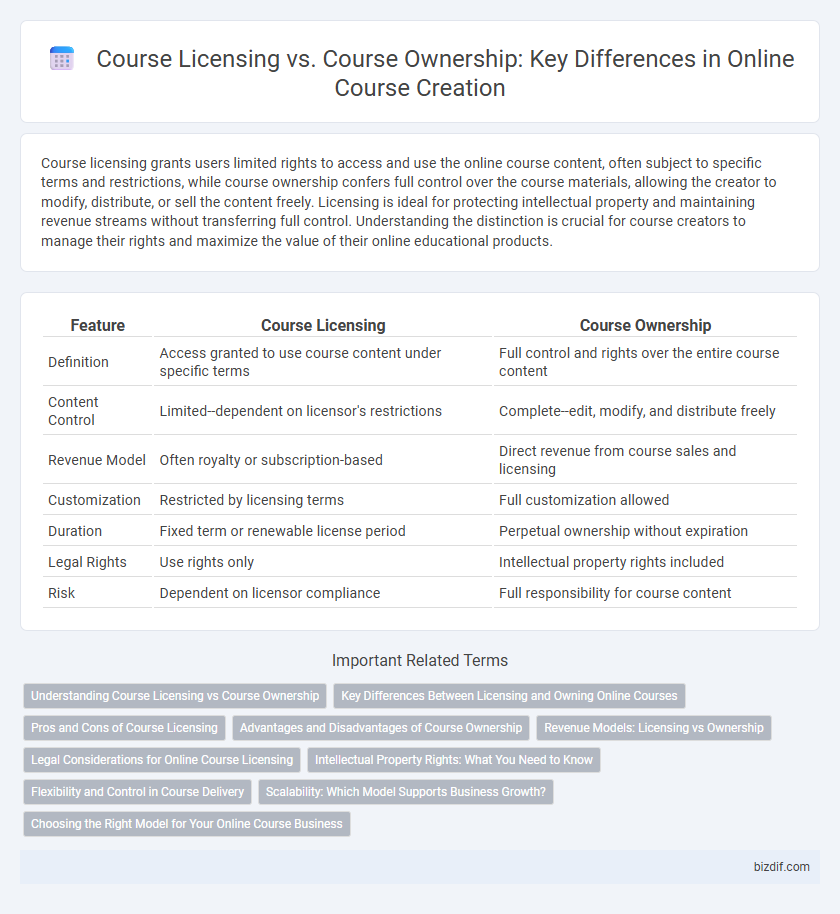Course licensing grants users limited rights to access and use the online course content, often subject to specific terms and restrictions, while course ownership confers full control over the course materials, allowing the creator to modify, distribute, or sell the content freely. Licensing is ideal for protecting intellectual property and maintaining revenue streams without transferring full control. Understanding the distinction is crucial for course creators to manage their rights and maximize the value of their online educational products.
Table of Comparison
| Feature | Course Licensing | Course Ownership |
|---|---|---|
| Definition | Access granted to use course content under specific terms | Full control and rights over the entire course content |
| Content Control | Limited--dependent on licensor's restrictions | Complete--edit, modify, and distribute freely |
| Revenue Model | Often royalty or subscription-based | Direct revenue from course sales and licensing |
| Customization | Restricted by licensing terms | Full customization allowed |
| Duration | Fixed term or renewable license period | Perpetual ownership without expiration |
| Legal Rights | Use rights only | Intellectual property rights included |
| Risk | Dependent on licensor compliance | Full responsibility for course content |
Understanding Course Licensing vs Course Ownership
Course licensing refers to granting specific rights to use, distribute, or modify an online course under defined terms, whereas course ownership implies full control over all intellectual property and content. Understanding the distinction is crucial for online educators to protect their work and monetize effectively, as licensing can limit usage while ownership ensures exclusive rights. Choosing the appropriate licensing model impacts revenue streams, content security, and the ability to customize or resell the course material.
Key Differences Between Licensing and Owning Online Courses
Course licensing grants limited rights to use or distribute the online course content under specific terms, while course ownership provides full control over the content, including modification, resale, and long-term usage. Licensed courses often come with restrictions on sharing or altering materials, whereas owners hold intellectual property rights, enabling them to customize and monetize the course freely. Understanding these distinctions impacts revenue models, content management, and legal responsibilities in online course creation.
Pros and Cons of Course Licensing
Course licensing grants the right to distribute or use course materials without transferring full ownership, allowing creators to expand reach and generate revenue through multiple channels. A major advantage of course licensing is maintaining control over intellectual property while benefiting from partnerships or platforms, but it can limit flexibility in modifying content or competing usage restrictions. On the downside, licensing agreements may involve complex legal terms and potential revenue sharing, which might reduce overall profits compared to outright ownership of the course content.
Advantages and Disadvantages of Course Ownership
Course ownership grants full control over course content, pricing, and distribution, enabling creators to build a unique brand and generate higher long-term revenue without platform restrictions. However, ownership also requires managing marketing, hosting, updates, and customer support independently, which can increase time investment and operational complexity. Unlike licensing, ownership carries more responsibility but offers greater freedom and potential scalability for online educators.
Revenue Models: Licensing vs Ownership
Course licensing allows creators to generate recurring revenue by granting usage rights to other educators or platforms, often through subscription fees or royalties. Course ownership enables full control over content and direct sales, leading to potentially higher profits per transaction but requiring more upfront marketing investment. Choosing between licensing and ownership depends on desired income stability versus autonomy in revenue generation.
Legal Considerations for Online Course Licensing
Course licensing in online course creation involves granting permissions to use the content under specific terms, while course ownership retains full control and rights over the material. Legal considerations include clearly defining license scope, duration, and usage restrictions to prevent unauthorized distribution and intellectual property infringement. Ensuring compliance with copyright laws and incorporating enforceable license agreements protects creators from potential legal disputes.
Intellectual Property Rights: What You Need to Know
Course ownership grants full intellectual property rights, allowing creators to control distribution, modifications, and monetization of their online courses. Licensing provides limited rights to use the course content under specific terms, often restricting duplication and resale while protecting the original creator's copyrights. Understanding the distinction between ownership and licensing is crucial for safeguarding your content and maximizing revenue streams in online course creation.
Flexibility and Control in Course Delivery
Course licensing offers limited flexibility, as it restricts how and where the course can be delivered based on predefined terms, whereas course ownership grants complete control over content distribution and updates. Owning a course allows creators to customize delivery methods, pricing, and platform choices without external constraints. This autonomy enhances the ability to adapt course materials quickly in response to learner feedback and market demands.
Scalability: Which Model Supports Business Growth?
Course licensing enables rapid scalability by allowing multiple users or organizations to access the content under flexible terms, generating recurring revenue without the need to continually create new material. Course ownership provides full control and customization, but scaling often requires significant investment in marketing and infrastructure to expand reach and user base. For fast business growth, licensing models typically offer more efficient scalability due to lower overhead and broader distribution potential.
Choosing the Right Model for Your Online Course Business
Course ownership grants full control over content, branding, and distribution, essential for building a unique online course brand, while course licensing allows others to use your content under specific terms, generating passive income with less management. Choosing the right model depends on your goals for scalability, control, and revenue streams in your online course business. Prioritize course ownership if you want long-term brand equity and customization, whereas licensing suits creators seeking broader reach with minimized operational effort.
Course licensing vs Course ownership Infographic

 bizdif.com
bizdif.com